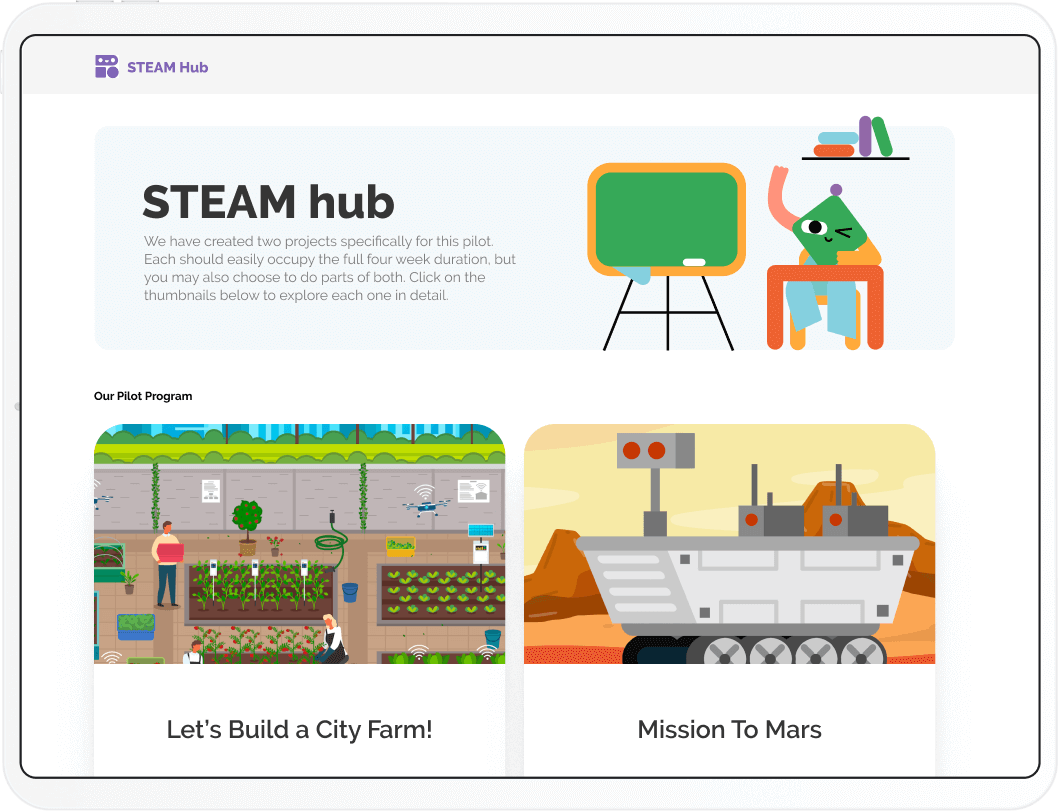Nash County Public Schools Pilot
.png)
How the Robo Wunderkind robotics-based STEAM program was adopted in K-2 classrooms across a school district
The rapid advancement of new technologies and the need to prepare students for these advancements has motivated many districts to re-evaluate their computer science instruction and overall exposure to these skills in the earlier grades. Nash County Public Schools has partnered with Robo Wunderkind to include several elementary schools to begin this work! Read how Nash County was able to use the Robo Wunderkind Pilot to engage learners and build the capacity of teachers to use coding and robotics with Kindergarten-Grade 2 students.
Getting Ready for Robo Wunderkind - Pre-Onboarding
Any time a district implements new programs, it's essential to have a positive initial experience for teachers. Robo Wunderkind partnered with Nash County administrators behind the scenes to plan for implementation success.
The working team identified risks and made key preparations, such as downloading the application to teacher and student devices and organizing the kits for each school. Every detail was considered, including charging and updating firmware, labeling kits and main cubes, and delivering the kits to the session location.
Onboarding
Onboarding consisted of a 4-hour workshop with educators receiving foundational STEAM instruction and the opportunity to explore the Robo Wunderkind building blocks, its application, and the content available in the STEAM Hub. The goals of this session were two-fold: to help educators understand the “Why” behind STEAM integration and to elicit buy-in for the program.
The session addressed two pressing questions on the minds of most teachers:
- Are younger students ready to use this kind of technology?
- How do robotics and coding connect to my core classroom topics?
The format challenged educators to begin coding in the live interface themselves. Once they discovered how easy it was, their question of whether younger students would have the capacity to pick up Robo Wunderkind was quickly answered. The Live interface allowed teachers to construct and control their robots in real time, like a remote control.
Teachers were then introduced to the STEAM Hub, the platform of open-and-go lessons for teachers. Nash County educators walked through these standards-aligned and story-based lessons and expressed delight at the alignment and organization of the lessons provided. One teacher said,
These lessons are easy to follow and well written. I feel like I can jump right into teaching! - Leslie Taylor
Most of us learn new things by doing them. Therefore, the session wouldn’t be complete without the opportunity to do an entire Robo Wunderkind lesson. Teachers role-played being teachers and students, helping them prepare for their first lesson and anticipate the student experience.
As they provided feedback to one another, teachers began to see how robotics and coding can be integrated across content areas. As one teacher demonstrated the ‘What is a Robot’ lesson, another chimed saying,
We could do this lesson with any read aloud and even turn it into a story problem - Elizabeth Murphy
Co-teaching
Teaching to our peers can help master new programs, but teaching to students can present a myriad of challenges. Nash County took advantage of Robo Wunderkind’s co-teaching program – where a member of our team joins the classroom – to ensure success in the early days.
With a member of Robo Wunderkind’s team on hand for support, teachers felt confident introducing Robo Wunderkind to their students, identifying skill gaps, and receiving real-time guidance.
Wow, it was amazing to observe you teaching the lesson and Matt guiding me in the background. I wasn’t expecting it, but we could keep rolling, and it was awesome!” - Natalie Shearin
Implementation
A major frustration for districts when adopting new tools is consistent usage by teachers. There are many reasons for this: a lack of classroom time, poor training, and low confidence in the program. But Nash County teachers successfully implemented the Robo Wunderkind program immediately, across grade levels, and with consistency.
Over time, participating in mentoring calls with their Success Manager has ensured that teachers will build on their confidence using the program, leading to a more sustainable STEAM ecosystem in the lower grade levels. Most importantly, lessons learned from the pilot program are incorporated into a full district roll-out plan.
Once I got going, I realized it was not as difficult as I thought it would be. The kids love it, and it’s so easy to use. - Sherronda Edge
Inspired by Nash County’s Pilot story? Try this hands-on STEAM tool supported by a library of curriculum resources with your students! Get in touch with us to learn more about it.
“
Love What You’re Reading?
Subscribe to our newsletter to get more just like it, sent straight to your inbox.
Gefällt Dir, was du liest?
Melde dich für unseren Newsletter an, um weitere Informationen direkt in deinem Posteingang zu erhalten.
















.png)
%20(1).png)

